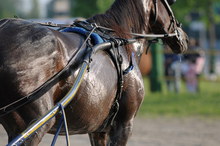Thereâs no getting around it. This has been a miserable summer. Unless you hail from Indonesia or the Amazon basin, youâve felt it. The heat and humidity have been unbearable and the possibility of heat stroke or heat exhaustion has been hanging over us all.

An overworked, overheated horse
The large muscle mass of a horse generates a tremendous amount of heat, particularly when exercising and, as they sweat, the horse looses both water and electrolytes, leading to dehydration.
Including our horses. Yes they, too, are subject to these conditions.
The large muscle mass of a horse generates a tremendous amount of heat, particularly when exercising. Conditions of high humidity and heat make it is hard for that heat to dissipate. In addition, as they sweat, they lose both water and electrolytes, leading to dehydration.
Dehydration untreated may escalate to heat exhaustion and heat stroke.
Horse owners and riders need to be very aware of the symptoms of heat stress, and act on them immediately. A rapidly breathing, sweaty horse can progress to heat stroke, which can be fatal, very quickly. A dull expression or behavior can also signal the onset of heat stress.
Heat exhaustion is characterized by rapid breathing (over 60 beats per minute), refusal to work, and coats that are dripping with sweat, while some horses exhibit âthumpingââa spasmodic jerking of the diaphragm or flanks. In addition, the horse may move very stiffly and abnormally, similar to a horse that is tying up.
Left untreated, heat exhaustion can rapidly turn into heat stroke. Heat stroke is evidenced by hyperthermia (a temperature of over 106 degrees) and a staggering, weaving gait. Horses may fall, rear, and seem unaware of their surroundings, making them dangerous to be around as they are unconscious of others. A coma and death may follow if they are not treated immediately.
Heat stress is not confined just to horses that are exercising. Horses that are in dry lots with no shade, in trailers, or in barns with no ventilation are also subject to the condition. So donât think that just because you are not working your horse, he wonât be affected by the weather.
So what should a horse owner do? Think ahead!
There are many things that can be done to prevent heat stress:
- Provide plenty of clean water at all times. And remember horses need much more water during periods of extreme heat.
- Put horses on electrolytes. A heavily sweating horse will lose not only water, but electrolytes, which need to be replaced.
- Be sure horses have access to shade, and in a hot barn, provide fans.
- Donât leave horses in hot trailers.
- Ride in the early morning or late evening.
- Clip horses with long coats.
Overweight horses are particularly susceptible so try to keep your horses at a healthy weight.
Horses that donât drink a lot of water may prove particularly at risk for heat stress. Hydration Hay® can be a boon in such circumstances. This block of compressed grass and alfalfa hay is mixed with water and provides hay and hydration in a tasty mix for those picky drinkers, particularly when faced with constantly changing water on the road.
But what if itâs too late and the damage has already been done? You have a dragon-breathing horse with a temperature over 105 degrees, what now?
Start with a cold, cold, shower. Studies conducted at the Atlanta Summer Olympics proved that there is no harm, only help, in applying cold water to an overheated horse.
âApplication of cold water to the overheated horses helped to dissipate heat by providing more water to evaporate from the skin, and by direct conduction of the horseâs body heat into the water that runs off the horse, carrying excess heat with it,â the study concluded.
Use a sweat scraper to remove excess water and then walk the horse or let it out in a shady area or a cool stall. Do not use a sheet in hot, humid conditions; it prevents the evaporation of sweat from the skin.
For heat stroke, ice packs should be applied to the horseâs head and the large muscles on the insides of the legs. If improvement does not take place quickly, or if the horse is staggering or falling, call a vet immediately.
The horse will need intravenous fluids and may need additional medication if its internal organs have been affected. Death can occur within a couple of hours so act quickly!
Brought to you by Eastern Hay
